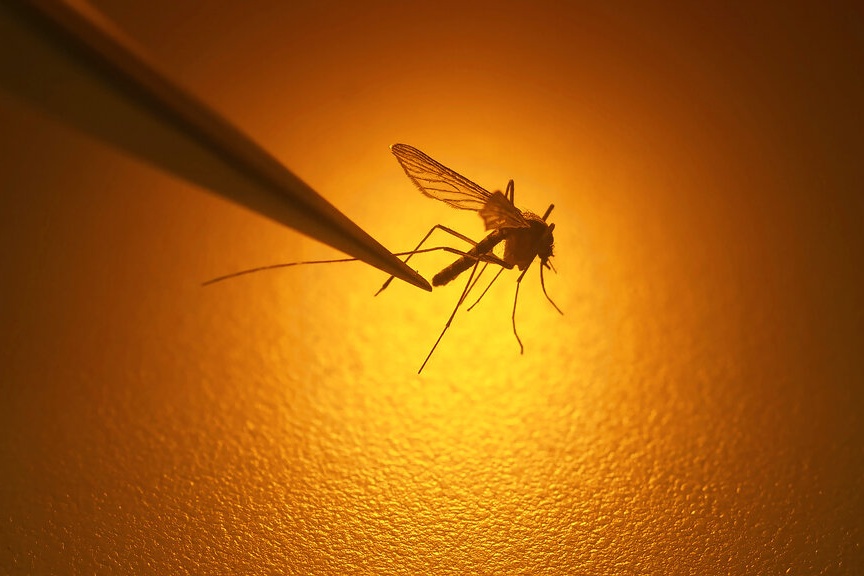
Updated Aug. 5 at 9:15 a.m.
As Coloradans enjoy barbequing, camping and the great outdoors, experts warn there is a risk of contracting West Nile virus.
So far this year, no human cases of the virus have been detected in Colorado, but state medical entomologist Chris Roundy confirmed there are active mosquito populations carrying the disease.
“We have tested hundreds of pools of mosquitoes from across the state, and we have had a few test positive for West Nile virus, specifically in Larimer County,” Roundy said.
On July 25, Colorado recorded its first human death of 2025.
Mosquitoes carrying the virus were first identified in Colorado in 2003. That year resulted in the most human cases of West Nile in state history, with 2,948. Sixty-six people died.
In 2023, the state saw a significant number of cases again, with 634 cases identified, resulting in 51 deaths.
That year, the state had an above-average snow pack. The extra moisture was followed by record precipitation in May and June. Experts say all that extra water helped create the perfect breeding environment for the unfriendly flying critters — not only in marshlands and remote locations, but also in people’s backyards and gardens.
“Mosquitoes are only capable of breeding in small pools of stagnant water. So, having a dog dish outside that fills up with water, a bird bath, or even just a tire sitting over in the corner of our yard, we can inadvertently create the perfect set of circumstances for mosquitoes to breed,” said University of Colorado assistant professor of entomology Sammy Ramsey.
The good news: experts don’t anticipate this mosquito season to be a repeat of 2023, despite all the recent rain.
“This winter, most of the state experienced below average snowpack, and while we have seen above average precipitation this spring, we’re still well below the rainfall we saw by this time in 2023,” Roundy said. “From our surveillance, mosquito activity is around our expected historic levels throughout most of the state.”
How does the state test for West Nile?
The Colorado Department of Public Health and Environment sets out traps baited with dry ice each year to get a gauge on which mosquito populations are carrying the disease.
“That dry ice is carbon dioxide, which draws the mosquitoes in,” Roundy said. “Once they're in the traps, we identify them by their species and their gender.”
There are two main species of mosquitoes in Colorado: Aedes vexans and Culex tarsalis. The Aedes vexans have distinct black and white markings on the body and legs. These nuisance biters are most common in June but do not spread disease.
Culex tarsalis, on the other hand, are a golden brown color and they’re the ones that can carry West Nile. This species becomes more active in late June through the first frost of fall.
“Once female culex mosquitoes have been identified — because the male mosquitoes don't blood feed — those pools are tested,” Roundy said.
How is climate change affecting mosquitoes?
Short answer: In a few different ways.
“First, we're experiencing milder winters, making it easier for mosquitoes to overwinter, resulting in larger populations,” Roundy said. “We are also experiencing longer, warmer springs, summers and falls. This is increasing the timeframe over which those mosquitoes can be active and may be transmitting diseases such as West Nile.”
Roundy told CPR News that climate change is also changing habitats throughout the state, making them more friendly to invasive species. “A great example of this is Aedes aegypti mosquitoes, which were detected in Grand Junction for the first time last year,” Roundy said.
The species can carry and transmit a number of viruses, including dengue, yellow fever and Zika, and they are being very carefully monitored by the state.
“Thankfully, there is a very low risk of transmission of those diseases in the Grand Junction area because there is not much international travel to introduce those viruses,” Roundy said.
Modern mosquito mitigation efforts
Each county and municipality has unique means to manage the local mosquito population. Boulder County Public Health, for example, focuses mainly on larval control. “Trying to go to the source, prevent those mosquitoes from becoming adults, flying around, biting people, being the nuisance that they can be — spreading disease,” said environmental health specialist Marshall Lipps.
“A lot of our time is spent actually going to the sources of the mosquitoes. So that could be an irrigated pasture, a roadside ditch, a pond, a marsh, things like that, and trying to control the mosquito larvae at that point using bacterial products,” Lipps said. “On top of that, we also set traps for the adult mosquitoes to monitor species type, overall abundance, and numbers. And then if needed, based on those adult traps, we will perform some adult control via truck-mounted foggers.”
Modern mosquito mitigation efforts used in the state are much safer than they used to be.
“I think there are some misconceptions that all of it is bad for the environment, but that’s not how we do mosquito control anymore,” Lipps said. “Yes, the [fogging] trucks do still exist, and yes, there is still fog, but the products are highly studied. They work very well and have a really limited effect on non-target organisms.”
Roundy agrees. “When we do spray within adulticides, it is highly regulated, and typically we do that right after dusk. That is when those mosquitoes are starting to become active and our other pollinator friends, such as bees, have gone to bed for the night. So we try to minimize how much we affect those other insect populations.”
How to protect yourself from West Nile virus
Personal Protection (The Four D's):
- Dress in long sleeves/pants.
- Defend with EPA-approved repellents (e.g., DEET, picaridin).
- Drain standing water around homes.
- Dusk/Dawn — avoid outdoor activity during these peak mosquito hours.
When venturing out this weekend, the best thing you can do for yourself is to use a repellent that actually works.
“The best way of preventing West Nile virus is to prevent mosquito bites,” Ramsey said. “And if you are not wearing some sort of repellent to mask the smells that they're looking for to locate you, you'll likely be bitten. The more times you're bitten, the more likely it is that a disease will be transmitted.”
DEET is still the most effective mosquito repellent, but there are other more natural options like lemon eucalyptus oil. Experts say that is also effective, but needs to be applied more frequently.
“And that's one of the concerns that I have about people's usage of (lemon eucalyptus), is that they don't always recognize it needs to be applied substantially more frequently than other repellants,” Ramsey said.
Science shows even when using effective repellent, some people really are more prone to getting bit than others.
“My mother is a mosquito magnet. Back in Maryland, we love crab picking outside. It’s our favorite pastime. And those mosquitoes would alight on her. She would be the only person to get bitten out of everybody in the family,” Ramsey said. “Now, what the research has found is that there are differences in the chemicals that are on the surface of your skin as a result of you sweating, as a result of things that are in your diet that are expressed in your sweat after you break them down in their secondary metabolites. All of these things create a cloud around you that has odorants in it that mosquitoes are capable of smelling. And some things are more attractive to them than others.”
How to protect your home from mosquitoes
One of the best things you can do to prevent mosquitoes from settling around your home or campsite is to clear any standing water.
“People will say, ‘No, I don't have any standing water.’ They're thinking of the typical pools or bird baths or things like that. However, look under the bushes. Maybe the recycling bin got blown over and blew a container under them that can hold water,” Lipps said. “Also, keep your lawn mowed, try to reduce harboridge for the adult mosquitoes, and really just take a good look around the property, including cleaning out rain gutters and things like that.”
If you have standing water on your property that can’t be drained, you can treat it with Bti, a bacterium found in soils with toxin-producing spores that specifically target the larvae of the mosquito, blackfly and fungus gnat.
“People might see these as mosquito dunks in home improvement stores,” Roundy said.








